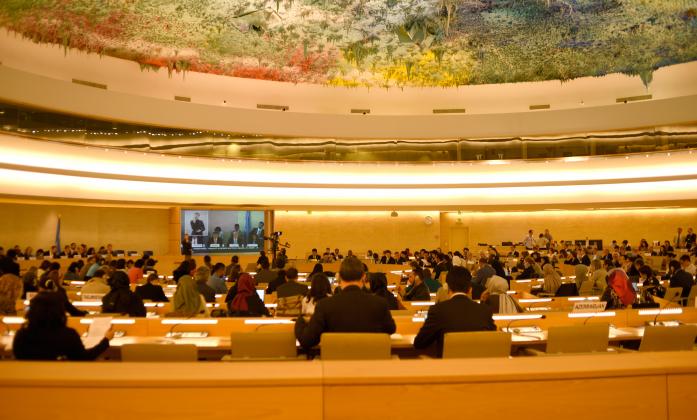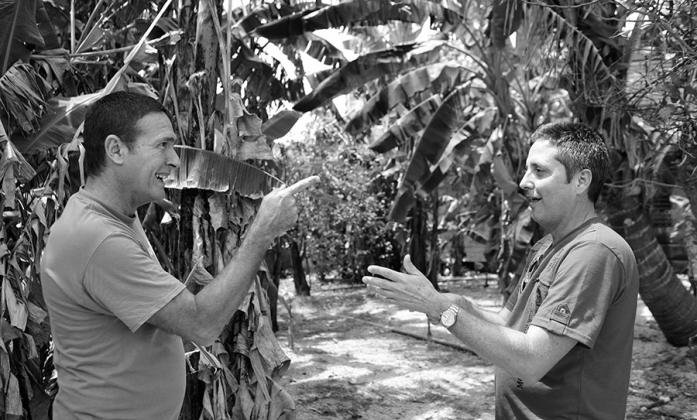
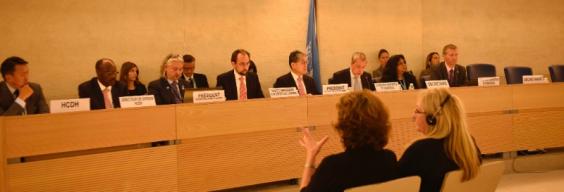
October 2016
The Human Rights Council's Social Forum 2016 brought focus on the progress made, and still to come, thanks to the CRPD.
Last week the
Human Rights Council's annual Social Forum took place in Geneva. This year's theme was “
the promotion and full and equal enjoyment of all human rights and fundamental freedoms by all persons with disabilities in the context of the tenth anniversary of the adoption of the Convention on the Rights of Persons with Disabilities”. The Forum included twelve sessions, including panels and roundtables, bringing together UN Member States, UN Agencies, and over 200 representatives of DPOs and civil society. IDA members played a pivotal role throughout, as panelists, participants and moderators of the official sessions, as well as in nine side events throughout the Forum, organised in close collaboration with partners across civil society, States and UN agencies.

The Forum was opened by an illustrious panel, which included H.E. Ambassador Jorge Lomónaco, Permanent Representative of Mexico and Mr. Carl Allan Reaich, Deputy Permanent Representative and Chargé d’affaires a.i of New Zealand, as Co-Chairpersons-Rapporteurs of the Social Forum and Mr. Choi Kyong-Lim, President of the Human Rights Council, and Mr. Zeid Ra’ad Al Hussein, United Nations High Commissioner for Human Rights, alongside IDA's Chair, Mr. Colin Allen.

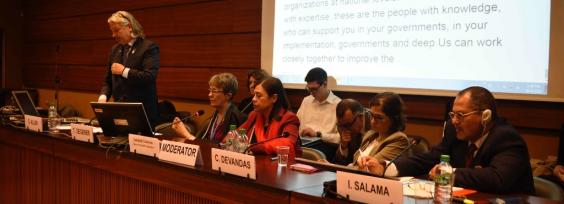 The official panel of the afternoon was on "Persons with Disabilities and Human Diversity: Embracing Diversity and Awareness Raising", which included a video message from Mr. Peter Ochieng, Chair of Global Partnership on Children with Disabilities Youth Council:
The official panel of the afternoon was on "Persons with Disabilities and Human Diversity: Embracing Diversity and Awareness Raising", which included a video message from Mr. Peter Ochieng, Chair of Global Partnership on Children with Disabilities Youth Council:
"We as youth with disabilities call upon, Member states, UN agencies, NGOs at all levels and other stakeholders to prioritise inclusive meaningful youth participation including participation of youth with disabilities in all sustainable development goals programs. 'Nothing about us, without us.'"
The panel identified CRPD contributions to policies and practices in line with its principles and showed effective strategies undertaken on awareness-raising, including on the role of the media. The panel particularly focused on the impact of the use of diversity as an advocacy strategy, it also brought concrete examples of development policies and of media and civil society on awareness raising, with concrete experiences from persons with disabilities from underrepresented groups as well as facilitating sharing of information on the impact of the CRPD to the work of the CESCR Committee.
The following panel addressed "
Accessibility and Non-discrimination: ‘Leaving No One Behind’", and included Ms. Pratima Gurung, of the Indigenous Persons with Disabilities Global Network. The panel discussed advances achieved with the adoption of the CRPD for specific populations and its role in 'leaving no one behind' as foreseen in SDGs. This included issues of accessibility and its impact on living in the community, experiences in policy and non-discrimination, indigenous people’s perspective of non-discrimination, age-based discrimination, the influence of the CRPD in the ad hoc committee on Elder persons treaty, alternatives to medical model, and accessibility to information technology.

The second day of the Forum began with a side event on "Persons with psychosocial disabilities and their rights under the CRPD", co-organised by the World Network of Users and Survivors of Psychiatry, African Disability Forum and Transforming Communities for Inclusion of Persons with Psychosocial Disabilities (TCI Asia), co-sponsored by the Permanent Mission of Portugal and Brazil, with support from IDA.
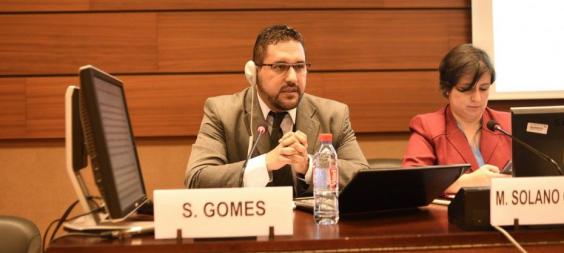
The morning's first official panel addressed "
Strengthening Equality and Specific Measures", identifying steps on policy and good practices to combating inequalities and structural discrimination, drawing on experiences from Latin America in poverty, social protection, housing, affirmative action, employment quotas, and inclusive education. The next panel discussion of "
Meaningful Participation and Empowerment" identified good practices for participation of persons with disabilities in society, including in policy-making, and measures for the empowerment of persons with disabilities to ensure compliance and contribution to inclusive policies, including supported and/or own decision-making, political participation, and the roles of CSO, regional and international monitoring mechanisms and courts. Following these panels, two further side events were co-organised by IDA.
One side event addressed "Underrepresented groups of persons with disabilities" and it was Co-organised by the African Disability Forum (ADF), Pacific Disability Forum (PDF), World Federation of the Deafblind, World Federation of the Deaf, International Federation for Spina Bifida and Hydrocephaly, and the International Federation of Hard of Hearing People.
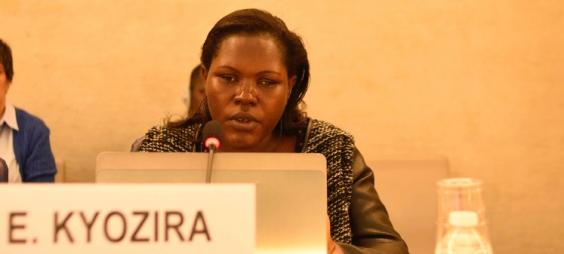
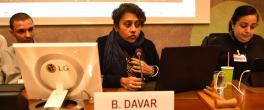
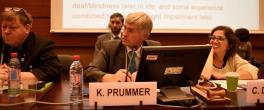
The first of two official panels that afternoon was on "
Making Development Inclusive", discussing practices and challenges for making the SDGs a reality under the guidance of the CRPD, building on existing work, and presenting possible next steps. The second addressed "
Strengthening Accountability", which included Geir Jensen, President of the World Federation of the Deaf, and identified next steps to increase monitoring of the human rights of persons with disabilities at national and international level, including the High-level Political Forum for Sustainable Development.
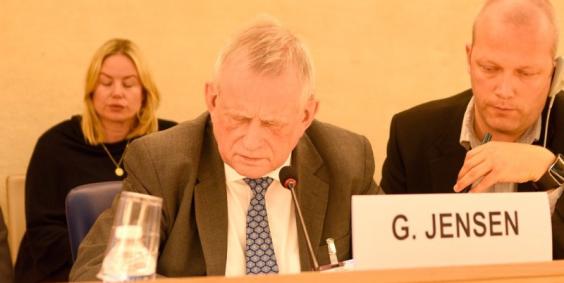
The third and final day of the Forum began with a side event on "
Technical cooperation and capacity-building in monitoring the rights of persons with disabilities" with the African Disability Forum, Pacific Disability Forum, Latin American Network of Non-Governmental Organizations of Persons with Disabilities and their Families (RIADIS), European Disability Forum (EDF) and Arab Organization of Persons with Disabilities, co-sponsored by the Permanent Missions of Thailand and Peru, with support from the International Disability and Development Consortium (IDDC) and IDA.

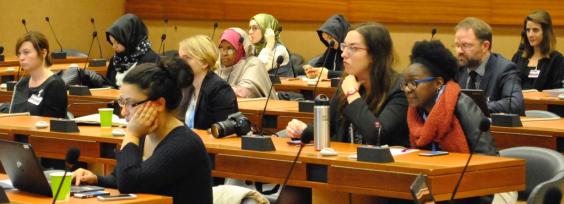
The official session was a roundtable discussion on "
Informing Policy", which presented the role of research and academia in informing policy, including the negotiation process of the CRPD and civil society's role, the influence of research in the CRPD and its understanding, examples of gender-related issues informing policy, as well as discussions of informing international policy and the opportunities, challenges and ways to go forward. The next panel on "
Realizing the Human Rights of Persons with Disabilities" provided concrete guidance on the next steps towards the realization of the rights of persons with disabilities from the perspectives related to law and policy development, the 2030 Agenda and national civil society, including the role of grassroots organization to ensure the realisation of rights, and the challenges, opportunities and expectations of CRPD & SDG implementation.
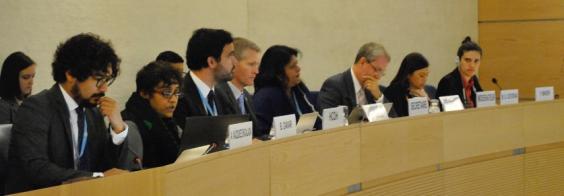
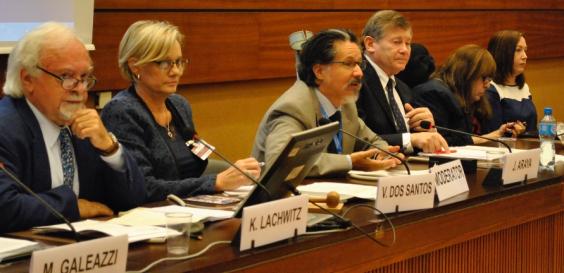
The parallel side event on "
Human Rights and Sustainable Development Goals - Monitoring and mutual reinforcement", co-organised by the International Disability Alliance (IDA), International Disability and Development Consortium (IDDC), and the Office of the High Commissioner for Human Rights (OHCHR) and co-sponsored by the Permanent Missions of Colombia, Chile, Italy, Indonesia, Mexico and Slovenia. During the discussion, Italian Ambassador H.E. Maurizio Enrico Luigi Serra highlighted that:
'Thanks to CRPD's ratification, school pupils with disabilities are moving from family life into education and society'.
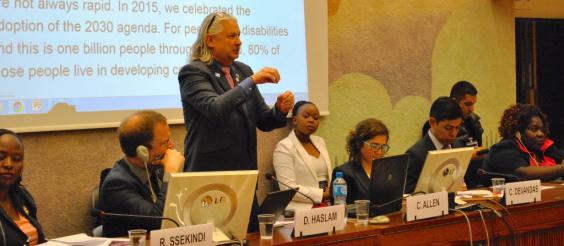
In the afternoon, the official panel session addressed "
Implementation of Agenda 2030 under the CRPD: The Future We Want" which focused on the role of national human rights institutions in support ing the mainstreaming of rights of persons with disabilities, increasing involvement in the international human rights system, expanding areas of work to follow up public policies and collaboration with organizations of persons with disabilities providing technical support, capacity building, and facilitating dialogue with the government, among a wide range of other thematic and sectoral areas.
The Forum was concluded with a session of "Summing Up, Conclusions and Closure of the Social Forum". During the last panel, Ms. Kate Gilmore, Deputy High Commissioner for Human Rights, H.E. Mr. Jorge Lomónaco, Permanent Representative of Mexico, Co-Chairperson-Rapporteur of the Social Forum and Mr. Carl Allan Reaich, Deputy Permanent Representative and Chargé d’affaires a.i of New Zealand, Co-Chairperson-Rapporteur of the Social Forum gave the closing remarks.
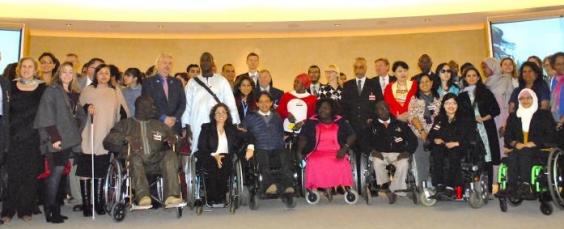
"I am humbled by having been invited to participate in the deliberations, and am leaving Geneva with renewed energy, filled with tips and new ideas to explore, and new friends to contact in our global struggle for equality and human rights for persons with disabilities."
- Lidia Pretorius, Department of Social Development Chief Director:
Advocacy and Mainstreaming Rights of Persons with Disabilities, South Africa
Throughout the Forum, its official sessions and side events, IDA Members were active and effective in presenting their perspectives and expertise on the rights of persons with disabilities, inclusive sustainable development, and moving ahead with the full ratification and implementation of the CRPD. DPOs also took the opportunity to meet with UN Missions and Agencies directly, making the SForum an opportunity for bilateral, direct and in-depth discussion as well as for broad open debate.
Click here for photos from our SForum album!
Thank you for reading, and we are looking forward to hearing from you soon!
Sincerely,
Vladimir Cuk
Executive Director of the International Disability AllianceEmail us at Contact [at] IDA-Secreatariat.org for more information
Click to download text version here View this email in your browser







 The official panel of the afternoon was on "Persons with Disabilities and Human Diversity: Embracing Diversity and Awareness Raising", which included a video message from Mr. Peter Ochieng, Chair of Global Partnership on Children with Disabilities Youth Council:
The official panel of the afternoon was on "Persons with Disabilities and Human Diversity: Embracing Diversity and Awareness Raising", which included a video message from Mr. Peter Ochieng, Chair of Global Partnership on Children with Disabilities Youth Council: 












